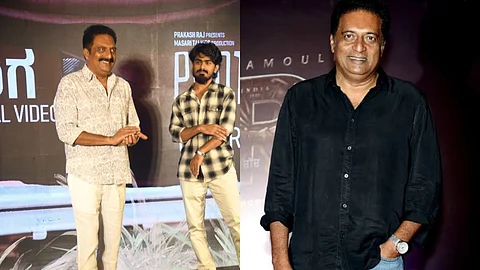

Photo, a film directed by debutant Utsav Gonwar, provides a poignant portrayal of the migrant exodus during the COVID-19 lockdown. Set to release on March 15 following its success on the festival circuit, the film has got backing from noted actor and filmmaker Prakash Raj, who is poised to present it to audiences. In his conversation with CE, Prakash Raj elucidates his reasons for championing this film and explores the intricacies of its thematic elements.
“When considering to present a film like Photo, one must recognise its capacity to analyse a significant moment in time,” Prakash Raj muses. “A photo captures not only a moment but a repository of memories that endure a lifetime. However, the true essence of a photo lies in the timing and context of its capture. While a candid photo may hold little intrinsic value, a photo imbued with memory, born out of crisis, an incident, or a decision, holds more significance.”
He continues, “Even children’s photos, seemingly uniform, hold distinct resonance when captured during a birthday celebration or a memorable trip. It’s the context and timing that elevate a photo from mere imagery to a cherished memento. Each photo carries its own narrative, shaped by the circumstances in which it was taken.”
The central plot of Photo revolves around the Vidhana Soudha (legislative house of Karnataka). Prakash Raj offers a layered perspective about this heritage building, as he says, “To me, Vidhana Soudha stands not merely as a heritage site, but as a symbol of governance, where decisions shaping the history and future of Karnataka are deliberated and enacted. The structure serves as both a historical monument and the epicentre of governance, directly impacting the lives of citizens. This dual interpretation adds richness and depth to the narrative of Photo, wherein every individual’s encounter with Vidhana Soudha carries not only personal but also societal implications.”
Photo effectively captures the struggles of lockdown life during the pandemic. But is the pandemic still relevant? “Thanks to medicine and science, the disease itself might not be as big of a concern now, but the impact it had on us is still significant. Governments worldwide weren’t fully prepared for the sudden lockdowns, and it showed our humanity - how we weren’t ready to understand each other’s pain. Fear became widespread, and we closed ourselves off from each other.”
Director Prakash Raj explains that Photo isn’t about criticising any specific government or ideology. It’s about our shared humanity and how the pandemic affected all of us, regardless of religion or politics. “The film delves into various societal issues beyond politics, caste, and social distancing, showing how we’re all connected through this experience. The film urges us to reflect on our actions and the importance of compassion during tough times,” he says.
In addition to covering the pandemic, Photo also highlights the beautiful relationship between a son and his father and mother. According to Prakash Raj, the film, very organically, portrays a humane story during the pandemic. If Prakash Raj was the director of Photo, how would he approach the film differently? “It would have been a different film, more jazzy. This is Utsav’s film, and I am just a part of it. I would just consider it as a father-son story and might have dramatised it. I would have played the father’s role, but definitely, I wouldn’t have made such a heart-touching film. Coming from Utsav, Photo has become more honest,” he says.
His impression of Utsav Gonwar’s directorial debut is quite positive, and so is the case with a few fresh talents. “I admire the way fresh directors like him are emerging from each industry, bringing new perspectives and content to the table. It’s inspiring to see the younger generation of filmmakers tackling stories that go beyond the glamour of the industry.”Films like Photo are examples of this shift where the focus lies on the story rather than star power. “As an actor, I appreciate being able to step back and simply enjoy a film as an audience member. It’s a reminder that being a star doesn’t necessitate being the lead in every film; sometimes, the story is better narrated by the performance of other actors. This realisation has led me to unlearn certain notions and embrace the idea that my involvement should be based on where I’m truly needed.”
“It’s been a hiatus since Prakash Raj, the actor and filmmaker, directed films. “Directing isn’t just my profession; it’s my passion. If the opportunity arises, I’ll seize it. Currently, I’m immersed in various pursuits like farming, theatre, and family. I’m focusing on nurturing emerging talent through Nirdiganta, a theatre incubation centre. This shift marks a return to my roots, albeit from a different angle. As an organiser and facilitator, I aim to empower younger generations by providing platforms for their stories to flourish,” he signs off.